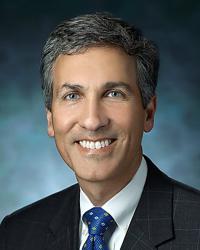
Nicholas J. Maragakis, MD
Neuromuscular Medicine
4.9 of 5 stars
62 Ratings, 27 Reviews31 Insurances Accepted
View allAbout
Professional Titles
Primary Academic Title
CV
Background
Leadership Title
Google Scholar
PubMed
Selected Publications
Locations
- Johns Hopkins Outpatient Center
- 601 North Caroline Street, Floor 5, Baltimore, MD 21287
- phone: 410-955-9441
- fax: 410-955-6402
Expertise
Education
Johns Hopkins University School of Medicine
Fellowship, Clinical Neurophysiology, 1999Johns Hopkins University School of Medicine
Residency, Neurology, 1998University of Utah School of Medicine
Medical Education, MD, 1994Board Certifications
Neurology
American Board of Psychiatry and Neurology, 2000Insurance
- Aetna
- Amerigroup District of Columbia
- AmeriHealth Caritas District of Columbia
- Beech Street
- Blue Cross Blue Shield Federal Employee Program (FEP)
- CareFirst
- Cigna
- Evernorth Behavioral Health
- First Health
- Geisinger Health Plan
- HealthSmart/Accel
- Humana
- JAI Medical Systems
- Johns Hopkins Health Plans
- Kaiser Permanente
- KeyCare
- Maryland Physicians Care
- Medicaid Maryland
- Medicare Maryland
- MedStar Family Choice District of Columbia
- MultiPlan
- Pennsylvania's Preferred Health Networks (PPHN)
- Point Comfort Underwriters
- Private Healthcare Systems (PHCS)
- Provider Partners Advantage HMO SNP Medicare Advantage
- South Central Preferred (SCP)
- Superior Vision
- TRICARE (Humana Military East)
- UnitedHealthcare
- Veteran Affairs Community Care Network (Optum-VACCN)
- Wellpoint (Amerigroup MD)
Reviews
4.9 of 5 stars
62 Ratings, 27 ReviewsThe Patient Rating score is an average of all responses to physician related questions on the national CG-CAHPS Medical Practice patient experience survey through Press Ganey. Responses are measured on a scale of 1 to 5, with 5 being the best score. Comments are also gathered from our CG-CAHPS Medical Practice Survey through Press Ganey and displayed in their entirety. Patients are de-identified for confidentiality and patient privacy.
- 5 out of 5 starsReviewed on 3/17/2024
Excellent care
- 5 out of 5 starsReviewed on 3/3/2024
Dr. Maragakis did a thorough view of my concern. He was attentive and straightforward forward regarding his review. This was my first visit with Dr. Maragakis and his team. I was very satisfied.
- 5 out of 5 starsReviewed on 2/21/2024
It was an excellent visit. Dr. Maragakis was kind, good listener and thorough in his examination. There were 2 residents during my visit who were supereb in their service - Dr. [ ] and Dr. [ ]
- 5 out of 5 starsReviewed on 2/18/2024
Dr Maragakis is very thorough, kind, professional, and caring. I have complete confidence in him.
- 5 out of 5 starsReviewed on 2/7/2024
Excellent, professional, caring, attentive, good listener & explains in detail. Very happy patient.
- 5 out of 5 starsReviewed on 2/7/2024
Always a friendly atmosphere
- 5 out of 5 starsReviewed on 2/4/2024
Dr Nicholas Maragakis was outstanding!!
- 5 out of 5 starsReviewed on 12/20/2023
This was my first visit and I was very impressed.
- 5 out of 5 starsReviewed on 11/19/2023
Dr. Maragakis is a kind, caring man. He takes his time with you & explains things so that you can understand.
- 5 out of 5 starsReviewed on 11/15/2023
I am very satisfied with Dr. Maragakis and the rest of the team for my situation. Everyone treated me with a very positive attitude and listened to all of my questions and thoughts. Also very organized!
- 5 out of 5 starsReviewed on 11/12/2023
Great human quality.
- 5 out of 5 starsReviewed on 11/8/2023
I liked Dr Maragakis a lot. He explained things very thoroughly and listened to my concerns.
- 5 out of 5 starsReviewed on 10/25/2023
Excellent neurologist
- 5 out of 5 starsReviewed on 10/22/2023
Top notch. World class physician. I am a physician so I can tell.
- 5 out of 5 starsReviewed on 10/15/2023
Intelligent, caring conversation about a profound disease. Meaningful visit.
- 5 out of 5 starsReviewed on 10/11/2023
Beyond outstanding
- 5 out of 5 starsReviewed on 9/13/2023
Brilliant , knowledgeable, calm and a good communicators.
- 5 out of 5 starsReviewed on 9/13/2023
Excellent I live about 2hrs 40minutes away. Definitely worth the drive!!
- 5 out of 5 starsReviewed on 8/23/2023
Excellent
- 5 out of 5 starsReviewed on 7/18/2023
Dr. Maragakis was excellent. Informative but kept to layman's terms. I felt very comfortable with the care I received.
- 5 out of 5 starsReviewed on 7/4/2023
Exceptional
- 5 out of 5 starsReviewed on 7/4/2023
Very good neurologist
- 5 out of 5 starsReviewed on 7/4/2023
He is very good at explaining things and making me feel comfortable during the visit! Can't thank him enough for his professionalism kindness and speaking at a level I can understand and not in all the technical medical terminology I would not understand.
- 5 out of 5 starsReviewed on 6/15/2023
Very professional he listen is very concerning first time meeting him great Dr. I am very pleased to meet him
- 5 out of 5 starsReviewed on 6/15/2023
Dr. Maragakis was very professional and extremely knowledgeable.
- 5 out of 5 starsReviewed on 6/13/2023
Very knowledgeable; very nice; explains everything so you understand; knows all drugs for my condition and which is best to help my problem areas.
- 5 out of 5 starsReviewed on 5/11/2023
This was my first visit to JH. I have ALS and was shocked at how much more knowledgeable the Doctor was than those at the 2 other providers I have seen so far. I will be moving all of my care to JH despite the fact that I have to fly to get there. It is worth it due to the huge gap in expertise
